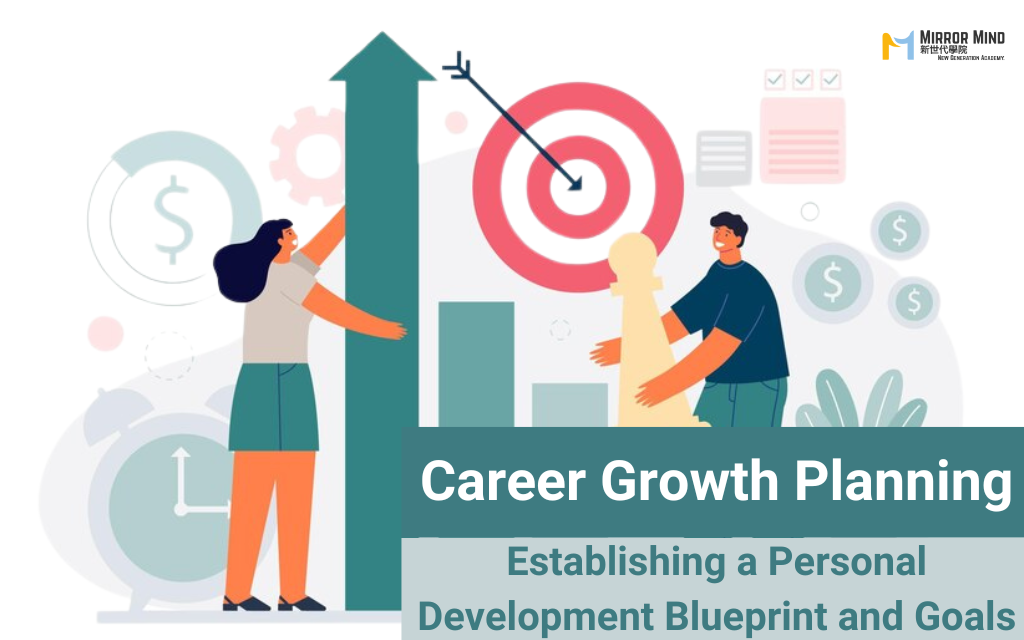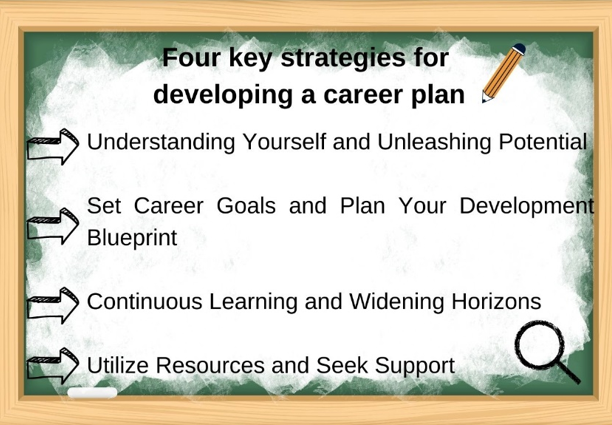Career Growth Planning : Establishing a Personal Development Blueprint and Goals
- 作者: Kay Chu
- 刊登日期: 2024-10-31 11:18:52
- 35 人已經看過
- 個人成長

In today's quickly changing workplace, having a defined professional
advancement strategy is critical. A complete personal development blueprint not
only guides us in the right direction, but it also assures that we make steady
progress toward our goals, resulting in long-term professional success.
Understanding oneself, defining career goals, continual learning, and
leveraging resources are all important activities that can have a huge impact
on our professional development. Let's look at these crucial areas and share
best practices for effective career development planning.

The first step in building a career development plan is to obtain a thorough
awareness of oneself. We need to consider our hobbies, values, personality
qualities, and areas of expertise. This self-awareness not only assists us in
determining the most appropriate professional route, but it also serves as a
solid foundation for future career planning.
For example, if you great at evaluating and solving problems and enjoy
connecting with others, you can seek a job in management or consulting. In
contrast, if you prefer working autonomously and enjoy hands-on chores, a job
in technology or engineering may be a suitable fit.
Beyond
understanding oneself, it is critical to actively pursue your potential. Don't
limit yourself to your current talents and experiences; instead, aggressively
study new knowledge and skills to broaden your job options. Continuous personal
development not only boosts our competitiveness, but it also creates more
opportunities for future job advancement.
Once you have a thorough grasp of yourself, you can begin creating precise
career objectives. These goals might be short or long-term, but the important
thing is that they are aligned with your interests and talents, which will
motivate you to keep going.
For example, a
short-term aim could be to obtain a professional certification within the next
year or to advance in your current work. A long-term objective can be to become
an expert in a certain profession within five to 10 years, or to create your
own firm. Regardless of the type of goal, ensure they are challenging yet
achievable.
After
establishing defined career objectives, you may start developing your
development strategy. This includes developing a thorough action plan to
achieve your objectives, identifying the necessary resources and support, and
establishing critical milestones and timetables for regular evaluation and
adjustment.
For instance,
if your goal is to become a department manager within three years, your
development blueprint might include:
1.Completing an
MBA part-time course this year to enhance management skills.
2.Actively
participating in cross-functional projects within the department to gain
comprehensive experience.
3.Volunteering
to take minutes and write summaries for department meetings to improve
communication and coordination skills.
4.Building a
good relationship with your superior to gain appropriate support and guidance.
By planning
step by step, you can ensure that you are always working toward your objectives
and altering tactics as needed to account for any changes.
It is critical
to retain a learning mentality after designing your career growth strategy.
This includes not only increasing professional abilities, but also remaining
current on industry developments and market dynamics. Keeping up with the times
is the only way to stay competitive in a fast changing workplace and achieve
long-term success.
For example, if
you work in IT, you must constantly improve your programming and data analysis
skills while also staying up to date on the latest technical breakthroughs,
such as artificial intelligence and cloud computing. In addition, you should
keep up with industry developments like as digital transformation and big data
applications to ensure that your knowledge and abilities stay relevant to
market demand.
Beyond your
professional domain, it's critical to widen your horizons and improve your
managerial abilities. Participating in cross-departmental projects improves
teamwork and communication skills while also providing deeper insights into the
organization's general operations. Furthermore, attending professional forums
and seminars helps you to share your expertise with peers while also learning
fresh ideas and viewpoints.
We are not alone in our career growth journey. We should actively seek various
sorts of assistance and resources to guarantee that our objectives are met
smoothly. Here are some crucial points to consider:
1. Communicate Effectively with Supervisors and the HR Department: Understand your
company's development strategies and talent requirements, and pursue suitable
training and development options. Participating in your company's leadership
development programs, for example, can help you improve your management skills
and prepare for future advancements. Furthermore, career counseling services
within the organization can provide expert career development assistance,
allowing you to better plan your career path.
2. Leverage
Your Network: Seek out mentors or alumni in your sector to learn from their
experiences and obtain useful career advice. Establishing a mentor relationship
with a successful professional will help you stay up to date on industry
developments and receive tailored career advice. Building positive
relationships with coworkers and superiors can provide additional support and
assistance in your work, as well as critical recommendations and direction when
necessary.
3. Take Part
in External Career Development Activities: Actively participate in industry
forums, talent development programs, and other activities to broaden your
network and acquire new development chances. Attending industry conferences
allows you to meet more colleagues and professionals, expanding your professional
network. These events also provide opportunities for learning and interaction,
allowing you to stay current on industry trends and technology advancements,
hence retaining company competitiveness.
4. Utilize
Online Resources and Social Media: Join professional online communities to
participate in conversations and share your experiences. Professional networks
can be built and maintained via platforms such as LinkedIn. Online resources
also offer a variety of career development courses and training programs to
help you succeed. For example, attending online skill enhancement classes
allows you to gain new skills at any time and from any location, keeping your
career competitive.
Effective use
of these tools can not only provide major benefits to ourselves, but also
generate positive connections and support for others, resulting in a more
strong and mutually beneficial professional network. This two-way support and
contact can help us build our careers more efficiently and promote a healthy
workplace atmosphere.
Career
development planning is an ongoing and dynamic process that demands us to
constantly learn, modify, and explore. We may sustain competitiveness in an
ever-changing workplace and realize our professional value by recognizing
ourselves, making goals, creating a plan, and constantly learning while
utilizing available resources.
Creating a career growth plan is more than just planning for the future; it is
an in-depth investigation of self-awareness and development. By creating and
implementing a personal development plan, we can adapt to changes, grasp
opportunities, and enhance efficiency, thus increasing our professional value
in the workplace. I hope this post inspires other professionals to take their
career development seriously and create the groundwork for future success. Let
us work together to create a brighter professional future!
為何選擇Mirror Mind
Mirror Mind 新世代學院以教練技巧及培訓,幫助企業及社區跨世代共融,提升本地企業及人才競爭力。
擁有 2,000 名學生
大量真實客戶案例
培訓超過 7,000 小時
擁有豐富業培訓經驗
橫跨 30 多個行業
為不同行業提供合適培訓
